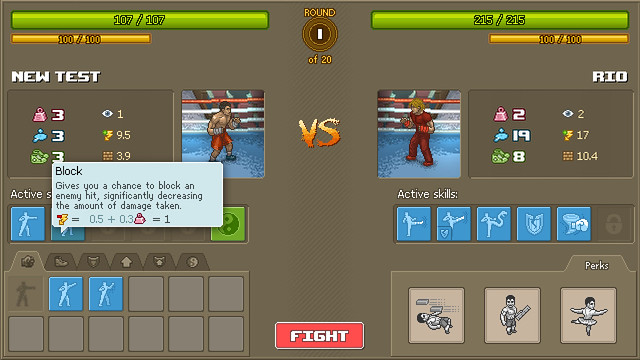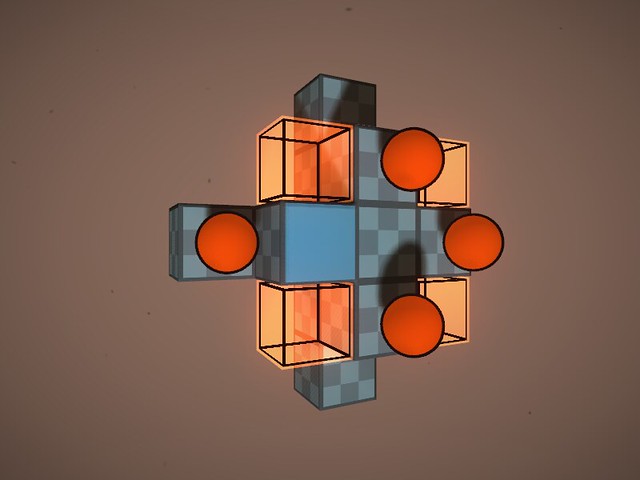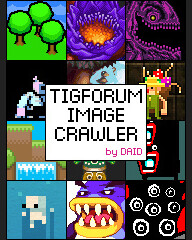Posts from ‘iPhone’ Category
Punch Club
By: Derek Yu
On: February 24th, 2016
The Rocky Balboa-esque boxing theme and pixel art are what got me to try out Punch Club, a management game from Lazy Bear Studios. On the surface, the idea of moving direct control away from the fighting seems like a bad one, but it’s satisfying to see your training pay off as your character punches, kicks, and blocks on his own. Outside the ring, it’s all about efficient management of time and money – you want to spend each day training and sparring to improve your chances of winning, but your character also has to buy food and gym membership, which means taking on construction and pizza delivery jobs to make ends meet. Making things more difficult is the fact that your three main stats – strength, agility, and stamina – actually drop a little bit at the end of each day. Just like in real life, it takes sustained work to keep your physique in good shape.
The biggest problem with Punch Club is the skill system. When I played the game, its three main build paths were very imbalanced. Initially, I went with a strength build, called the Way of the Bear, and found halfway through that I had hit a wall against the agile opponents whom the game heavily favors. The intent behind strength characters is that they get fewer opportunities to punch, but can end matches quickly if they can string some hits together. In practice, unless your agility stat is comparable to your opponent’s, you probably won’t land a hit at all. The Way of the Tiger, on the other hand, allows you to focus solely on agility and a little bit of stamina, learning counterattacks that use your opponent’s strength against them. The supposed weakness of agility – damage potential – ends up not feeling like a handicap at all. And the stamina-focused Way of the Turtle is apparently even harder to succeed with than Bear.
It’s a shame, because the interplay between the resource management and fighting works well fundamentally. If you were given more interesting and well-balanced choices in terms of designing your character and his (or even her?) story, it could have found a permanent home on my phone (where I think this game is best-suited). As it is, one time through is enough for me.
Hadean Lands
By: Derek Yu
On: December 1st, 2014
Andrew “Zarf” Plotkin is a well-known and influential figure in interactive fiction – on top of penning classic IF games like Spider & Web and Shade, he also developed the Blorb package format, Glx API, and Glulx virtual machine for making and playing them. His latest game, Hadean Lands, is four years in the making (following a successful Kickstarter) and is apparently one of the largest and most complex IF games to date, spanning 73,000 words of printable text and 170,000 words of logic (according to Andrew’s twitter). In the game, you play a young alchemist who has awoken to find him or herself trapped in a crashed starship, armed only with your knowledge of alchemical rituals and whatever ingredients you can scrounge up on the ship.
I’ll spoil some of the unique features of the game after the jump:
Kickstart This: Band Saga & Interview with Rekcahdam
By: Paul Eres
On: September 24th, 2014
Band Saga is a musical roguelike—basically it generates action roguelike dungeons based on its own Genesis-like FM sequencer, which can then be played through. You can generate levels based on importing your own MIDI music, or by composing music within the game (which can be shared with a text string online with other players). Also interesting is that you can change a song while playing through the dungeon based on that song, which would then affect the dungeon you are in. And as you can see from the trailer, the animation is also very nice.
I interviewed Rekcahdam to get a more in-depth look into how it all works, read it under the jump!
Kero Blaster
By: Derek Yu
On: June 4th, 2014
Given its immense popularity, fans have been eagerly awaiting a follow-up to Daisuke “Pixel” Amaya’s classic platformer Cave Story. While Kero Blaster isn’t a true sequel, it does have the charming aesthetics, memorable character design, and polish we’ve come to expect from a Pixel game. However, the adventure is also much smaller in scope – playing through two loops of the game will probably only take a few hours.
On iOS the game controls decently with an on-screen pad. Instead of a button, shooting is handled with a nifty triangular slider, which makes aiming easier and frees up your thumb for jumping. You can also get the Windows version from Playism, which supports keyboard and gamepads.
Kero Blaster probably won’t make a Pixel fan out of anyone who wasn’t already one, and for those who are, it could be a little disappointing due to the small scope. But what is there is quite enjoyable.
Pocket Fleet
By: ithamore
On: March 4th, 2014
Do you want to shoot words, bullets, or missiles? This is socializing brought to you.
Pocket Fleet is a MMO space arena shooter with different modes of play and a growing, global community. It is the latest release from Overdose Caffeine: a Turkish group of developers focusing on mobile and browser based games.
Edit: One of the developers wanted to point out that Pocket Fleet is also on Kongregate.
868-HACK / 86856527
By: Derek Yu
On: November 6th, 2013
Michael “brog” Brough’s 868-HACK is a hacking-themed roguelike on iOS that eschews exploration for focused, single-screen tactics. In the game, the player must traverse 8 levels, called “sectors”, filled with data – either points, which are used for scoring, or progs, which are used for defense against the enemies that are summoned to stop your intrusion. Enemies come in four types and move in simple patterns that are easy to exploit in small numbers but quickly become deadly in diverse mobs.
There’s a lot to like about 868-HACK, like the fun theme, the obvious risk/reward mechanisms, and the innovative zapping attack that hurts and stuns enemies. Figuring out how to use zapper and prog to clear out large groups of enemies is extremely satisfying. In many ways, 868-HACK distills the roguelike experience down to the parts where you’ve been dropped into a room full of monsters you’re not fully prepared for and each move is potentially life-threatening.
The free, Windows version that was made for 7DRL is called 86856527 and is still available for download, but the changes for iOS are well worth the $5 price tag, in my opinion. A port of 868-HACK to PC is also planned, but there’s no release date yet.
Preview: Hiversaires
By: Paul Eres
On: April 4th, 2013
This is a guest post by offal.
After years of releasing engaging short-form games, prolific digital artist Aliceffekt is nearing completion of his first independent commercial project, Hiversaires, for iOS. Committing himself to full time development at the beginning of February, Aliceffekt has worked solo on the game, handling design, code, art, and music.
Teaser – Star Command
By: Alehkhs
On: April 11th, 2012
The teaser trailer for Warballoon Games’ Star Command has landed, giving us a glimpse into the fantastic pixel art of their upcoming spaceship-management game.
Star Command allows players to take control of a starship in humanities distant future. Players build their ship, staff and manage their crew, explore the galaxy, battle other species, discover far off worlds and attempt to control the universe.
The game is scheduled to launch this summer on iOS and Android devices, but the developers have plans for a future, “Ultimate” PC version as well, which would include “all the campaigns, all the expansions, [and] possible multiplayer.” I can not wait!
A Few Good iGames
By: Derek Yu
On: January 19th, 2012

I’m not too in touch with the mobile market (see what I unintentionally did there?), but here are a handful of recent iOS releases that caught my eye:
Super Crate Box iOS – Vlambeer’s popular action game has made its way to iDevices. I’m pretty impressed with how they handled the controls, especially after the 1.1 update. It treats the buttons almost like they’re sliders, and once you get used to it, 90% of the deaths feel like your fault. The screen even scrolls to let you see crates that might be hiding under your fingers.
Fingle – An IGF Best Mobile Game finalist, Fingle plays kind of like Twister for your phalanges. A neat idea that should make for some steamy family gatherings!
Puzzlejuice – Asher Vollmer’s new puzzle game combines Tetris with match-3 and Boggle, and apparently those pieces fit together quite well (I swear I’m not doing this on purpose). Creating rows will turn the squares into letters, which can then be connected into words to make the blocks disappear. Multipliers are granted for spelling, but can also be extended by matching colors and making more letters.
A cool concept in and of itself, but the execution is what drives it home. A slick magnifying window pops up as you’re spelling words and overall, the interface feels very polished. Art direction by Greg Wohlwend (Solipskier) is as good as expected. (EDIT: You should also check out the soundtrack, by Jimmy Hinson. Had my audio turned down, so I didn’t realize how nice it is.)
English Country Tune
By: Derek Yu
On: December 2nd, 2011
Stephen “increpare” Lavelle has released English Country Tune, the latest of his many mind-expanding video game projects, but also his first commercial release. In ECT, the player controls a flat panel that can flip itself onto adjacent tiles in 3d space. The goal of the early levels is to flip “larva” into glowing cubes. The larva will “fall” according to the direction that they were flipped, introducing you to the spatial nature of ECT’s puzzles. As you advance to later levels, you’ll encounter new goals and obstacles (watch the trailer below for a sneak peak at some of those).
Suffice to say, if you like unique and challenging puzzlers, you should check this one out – a demo that covers the first couple of worlds is available from the website (full version $10).




